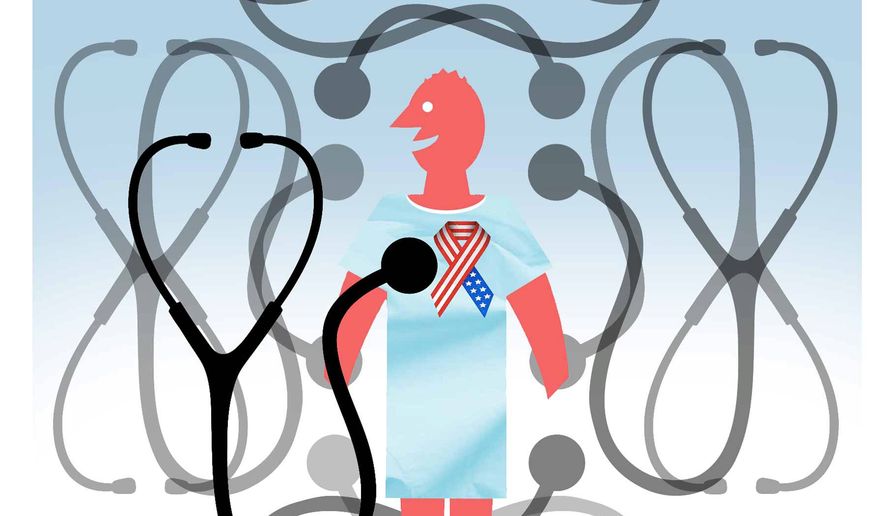OPINION:
From 2007 to 2009, I served as undersecretary for health in the U.S. Department of Veterans Affairs (VA). Overseeing the Veterans Health Administration (VHA), I often saw the best of what our nation offers veterans recovering from the wounds of war in a system staffed by committed health professionals devoted to providing quality care.
Unfortunately, I also witnessed the shortfalls of that same system, where bureaucracy and an outdated institutional model created obstacles, waste and missed opportunities for reform. While we worked diligently to set the VHA on a sustainable course for the future, it was clear the model was under tremendous strain.
In the seven years since my retirement, the strain has only grown greater as the VHA struggles to adjust to the changing demands for care among a diverse population of veterans.
The current VHA — a large, centralized bureaucracy trapped in the policies, procedures and assumptions of the last century — is simply unprepared to respond to the health care needs of today’s veterans. What is needed is a plan to transform the VHA to better meet those needs.
A proposal in Congress, the Caring for Our Heroes in the 21st Century Act, offers a promising way forward that will provide that transformation and ensure veterans have access to the timely, high-quality care they deserve.
This legislative draft by Rep. Cathy McMorris Rodgers, a Washington Republican, would enable critical reforms to the VHA to better reflect the realities of health care in the 21st century.
Notably, it would convert the VHA into a government-sponsored nonprofit enterprise, thereby separating its health insurance and clinical care functions. This restructuring would afford the VHA greater flexibility in staffing, increase efficiency and put caring for the veteran back at the center of the VA mission.
The Caring for Our Heroes Act would also allow veterans greater choice in their health care by expanding the opportunity to seek compensated care from private-sector providers (just as Medicare and Tricare do). There’s no reason veterans must be tied to a single health care provider. This common-sense concept has strong public support: A recent Gallup poll found that 91 percent of Americans believe veterans should have the option to seek care from any provider, not just the VA; other polls of veterans have found similar support for enhanced choice.
The McMorris Rodgers proposal would also implement a rethinking of the VA’s aging infrastructure to better reflect shifts in demographics and demand, and it would improve VHA administration by establishing an independent governing commission to implement reform and provide nonpartisan, expert oversight.
These are timely proposals that would make a significant contribution to modernizing the VHA, while maintaining and strengthening the strongest parts of the existing system.
The reality is that today’s veterans have different needs from those of earlier generations, and the VHA should keep pace with that change. In 2014 and 2015, I served on a bipartisan independent task force comprised of experts on veterans’ issues and health care. Our goal was to rethink VHA care in a way that preserved the best parts of the system while addressing the vulnerabilities that have created problems for veterans and for VHA staff. The McMorris Rodgers draft reflects several of the principles for reform we advanced.
I know from my time at the VHA that the vast majority of the division’s employees are dedicated individuals who put the highest priority on caring for their patients. Unfortunately, the VHA’s outdated model and resistance to reform makes it very difficult for them to deliver the timely, quality care they seek to provide.
As they find their efforts stymied by bureaucratic obstacles, they are likely to grow frustrated and demoralized. A better model for administration and management, as presented in the Caring for Our Heroes Act, would arrest that downward spiral and restore the VHA to its rightful position as a top-flight provider of veterans care.
Regrettably, much of the response to the draft legislation has been predictably and unnecessarily politicized. Accusations that these reforms would result in “privatization” of VA care represent a profound misreading of both the legislative proposal and the intentions of its proponents. Such accusations are irresponsible and false, and fail to offer a constructive way forward.
The status quo is not acceptable. The Caring for Our Heroes Act may not solve every one of our challenges with veterans care, but it will take a positive step forward to bring the VHA into the 21st century. These proposals will strengthen the VHA and transform it into an organization better aligned with the realities of health care in the 21st century.
Congress should act now to take that step forward.
• Michael Kussman is a physician and retired U.S. Army brigadier general.




Please read our comment policy before commenting.